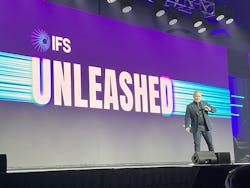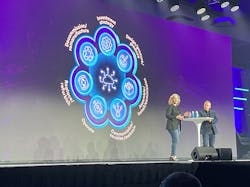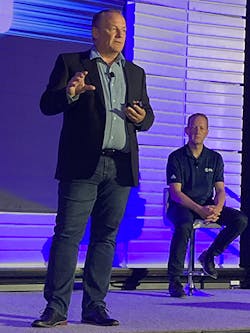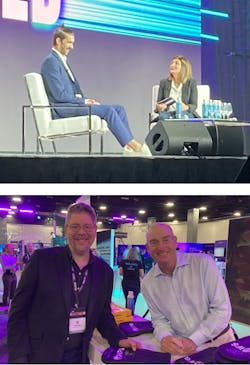Expand your focus beyond the asset to include environmental, social, and governance goals and resource management
For asset management professionals working in the age of Industry 4.0, your work is no longer defined solely by the value you can extract from physical assets. Organizations are now measuring success by how much value their teams can extract from their data as well, from improved field service efficiency to more effective carbon footprint reporting and environmental compliance.
This was the central message communicated at this year’s IFS Unleashed customer conference, which took place Oct. 10-14 in Miami FL. IFS is a leading enterprise software solution provider, specializing in enterprise asset management solutions and having a strong presence in three additional application segments: ERP, field service management (FSM), and enterprise service management (ESM) / IT service management (ITSM).
During the conference keynote address, IFS CEO Darren Roos and IFS Global President for Service Management, EAM & Global Industry Marne Martin emphasized the increasing importance of what IFS terms “moments of service,” the many opportunities that emerge during project planning and execution which accelerate time to value and improve the customer experience.
“IFS exists to help you create moments of service,” said Roos, and these moments help build loyalty with customers. “We talk traditionally about those silos of ERP and FSM and EAM, but the fact that we bring that capability together on a single platform” is what enables customers to take advantage of these moments and extract value from data being collected across the organization.
Key success stories
The conference keynote showcased the moments of service associated with several compelling customer success stories, each of them anchored in asset management but illustrating how those project data can be used to drive value beyond the physical asset.
“Assets and equipment are at the heart of what we do here at IFS,” said Martin. “But then you think about the aftermarket service revenue, the new value-based, digitally enhanced business models you launch in the future – we call this ‘servitization.’ There's a lot that goes into it, and it’s a huge opportunity to even think about maintenance and service differently.”
Success stories included the following:
- Briggs Equipment, a full-service material handling company with over 50,000 owned assets and 750 field-based employees, implemented IFS EAM and ERP to streamline service management, scheduling, and customer billing as well as IFS Success for ongoing success management and services, generating $9.7 million in annual cost savings.
- Smart Care Equipment Solutions, specializing in programs and commercial kitchen repair solutions customized for foodservice operators in the U.S., fulfills more than 250,000 work orders annually. By implementing IFS FSM and IFS Success, they were able to bring all acquired companies into a single service management platform, thereby increasing field tech utilization to 86% and, through the use of AI and machine learning, increasing predictability to 90%. In real terms, these improvements equate to one extra tech appointment per day, which drives millions of dollars in additional annual revenue.
- Southwest Airlines, the largest domestic carrier in the U.S. with more than 60,000 employees and more than 4,000 flights per day, tackled what might be the largest MRO project in the world. In early 2022, Southwest went live with IFS MRO Solutions to support the maintenance of their entire Boeing 737 fleet by introducing automation for processes and real time compliance at the point of maintenance.
- Telstra, Australia's largest telco provider with more than 6,500 maintenance engineers covering the most expansive network on the continent, partnered with IFS to improve the resilience and the efficiency of this team. Together, they implemented a state of the art, real-time dynamic scheduling engine to get the right Telstra technician to the right place at the right time while retaining the ability to interface with key legacy work management systems.
Roos also reiterated IFS' goal to maintain their business focus on incremental growth in five key complex verticals – aerospace/defense, energy/utilities, construction/engineering, manufacturing, service industries – preferring that customers to be able to rely on IFS' long-term focus and value delivery to these five core markets.
Continued product innovation
IFS Chief Product Officer Christian Pedersen followed the keynote by providing an in-depth update on the autumn release of IFS Cloud, termed “22R2” as the second in IFS's bi-annual release cycle.
Pedersen noted that IFS products in general will continue to evolve around three areas – industry consolidation, physical asset management, and environmental, social and governance (ESG) goals and compliance reporting. He took special note that compliance with ESG goals are fast becoming a top industry priority, and that organizations are making a shift from focusing just on “cost” and expanding that to include “cost + experience + environment.”
“Your organization's environmental, social, and governance goals are in the spotlight,” said Pedersen. “Our message to our customers is: Stay focused on ESG goals and making an impact on the planet.”
In response to this industry focus, many features in IFS Cloud 22R2 are aimed at making it easier and faster for customers to collect, manage and record key data to provide visibility into their environmental performance and help meet ESG goals, including:
- New functionality to track indirect greenhouse gas emissions to assess an organization’s overall carbon footprint in accordance with the Greenhouse Gas Protocol, which supplies the world's most widely used greenhouse gas accounting standards.
- The ability to help company and project teams connect and extract data from various sources and assess their performance in Scope 1 and 2 of the IFS Sustainability Hub.
- A new feature enabling organizations to record vehicle usage and environmental costs in the planning and scheduling optimization (PSO) process. This feature allows companies to capture data around the performance of different vehicle types and compare the results, while also enabling report generation to support ESG initiatives.
Pedersen also reviewed key capability enhancements in IFS Cloud 22R2, adding that IFS will continue to introduce new applications and services as needed. Enhancements of interest to maintenance and reliability professionals include:
- Defining employees in the record of one company and making them available as employees and resources in other companies to reduce HR administration and simplify technician task reporting.
- Initiating the procurement process for parts in one legal entity and concluding it in another, where cost of part replenishment transfers from the asset-owning company to a different company
- Reducing spare part inventory and waste by empowering mobile service technicians to manage the return of unused inventory and uninstalled components easily and accurately
- Expanding shift planning capabilities via enhancements to the dispatch console for managing in-flight work, to ensure the right resources, with the right skills, are available for scheduling, including on-call scenarios
- Enabling dispatchers to locate and communicate with the field technicians more easily, in order to reallocate jobs when needed and to identify and resolve any issues to ensure service levels are achieved.
About the Author

Thomas Wilk
editor in chief
Thomas Wilk joined Plant Services as editor in chief in 2014. Previously, Wilk was content strategist / mobile media manager at Panduit. Prior to Panduit, Tom was lead editor for Battelle Memorial Institute's Environmental Restoration team, and taught business and technical writing at Ohio State University for eight years. Tom holds a BA from the University of Illinois and an MA from Ohio State University




